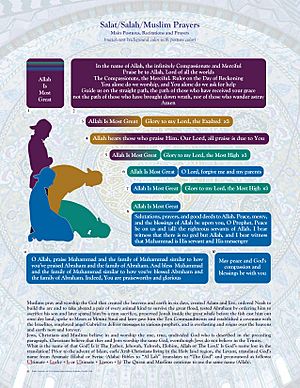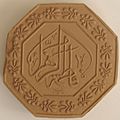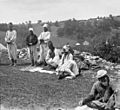Salat facts for kids
Salat is the special way Muslims pray to Allah (God). It is one of the five most important duties for Muslims around the world. To perform Salat, a person needs to be ritually clean. This cleanliness comes from a special washing called ablution (wuḍūʾ).
For Sunni Muslims, Salat is performed five times every day. The times for these prayers are set by the movement of the Sun. Before each required prayer, there is a special call to prayer called the Azan. The Prophet Muhammad said that whoever answers the Azan with faith will enter paradise.
Contents
What is Salat?
Salat is a way for Muslims to connect with Allah. It is a time for worship, thanks, and asking for guidance. Performing Salat helps Muslims remember Allah throughout their day. It also reminds them of their duties and purpose.
Why is Salat Important?
Salat is a central part of a Muslim's daily life. It helps build a strong relationship with Allah. It also teaches discipline and focus. Muslims believe that Salat brings peace and blessings. It is a way to show devotion and gratitude.
How to Perform Salat
Performing Salat involves specific movements and words. These actions show humility and respect to Allah. The prayer usually starts by facing the Kaaba in Mecca. This is a holy building in Saudi Arabia.
Steps of Prayer
Salat includes several steps:
- Standing: Muslims begin by standing upright. They raise their hands and say "Allahu Akbar" (God is the Greatest).
- Bowing: They then bow from the waist. This posture is called rukūʿ.
- Prostrating: Next, they go down to the ground. They place their forehead, nose, palms, knees, and toes on the floor. This is called sujūd. They do this twice.
- Sitting: Between the two prostrations, they sit briefly. They also sit at the end of the prayer.
During these movements, specific verses from the Quran are recited. Special prayers and praises to Allah are also said.
When to Pray
Muslims perform Salat at five specific times each day. These times are:
- Fajr: Before sunrise.
- Dhuhr: At midday, after the sun passes its highest point.
- Asr: In the late afternoon.
- Maghrib: Just after sunset.
- Isha: At night, after twilight disappears.
These prayer times help Muslims structure their day around their faith.
The Call to Prayer (Azan)
The Azan is a beautiful call recited from a mosque. It tells Muslims that the time for prayer has arrived. A person called a muezzin recites the Azan. Hearing the Azan reminds Muslims to prepare for Salat. It invites them to come to the mosque or pray wherever they are.
Images for kids
-
Various prescribed movements in salah, which collectively constitute a rak'ah. From left to right: rukū', qiyām/i'tidal, sujūd, takbīr and qu'ūd/julūs.
-
Women praying in Najaf, Iraq on Eid al-Fitr
-
Though not a mandatory part of the course, most Muslims supplicate after completing salah.
-
A Sunni Muslim (left) and Shia Muslim (right) performing the Friday prayer in Tehran. Some Sunnis perform salah with the hands clasped ("qabd"), while Shia offer salah with their hands at their sides ("sadl").
-
Bosniaks praying in an open field, ca. 1906
-
President Joko Widodo of Indonesia (front row, fourth from left) joining prayer in congregation with Vice President Jusuf Kalla (third from left), other cabinet members, and other worshippers.
-
Friday prayer for Muslims in the streets of Dhaka, Bangladesh
See also
 In Spanish: Salat para niños
In Spanish: Salat para niños
 | Roy Wilkins |
 | John Lewis |
 | Linda Carol Brown |











